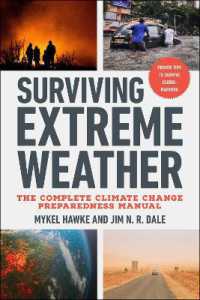Full Description
This book offers readers a diversity of perspectives, experiences and practical examples from various facets of Environmental and Sustainability Education (ESE) that can propel practice, further research and inform decision-making in the region, thus making for more cogent and effective ESE.
The Caribbean region is comprised of what is said to be the largest number of Small Island Developing States (SIDS), together with the non-island nations of Belize, Guyana, and Suriname. Although diverse with respect to governance, size, topography, and income, the Caribbean region has a common set of geographic and socio-economic characteristics that make it vulnerable to environmental hazards, economic challenges and social instability. Further to these particular vulnerabilities are various phenomena that pose critical sustainability challenges, two of which are climate change and crime and violence. Consequently, responsive and relevant ESE is needed to address these issues through knowledge enhancement, attitudinal change, skills development and behaviour change. As we seek solutions, this text brings together various empirical and theoretical contributions focused primarily on the English-speaking Caribbean region, that explore a number of areas such as ESE pedagogy, teacher education, values education and progress evaluation.
This volume will be a key resource for educators, policymakers, scholars and advanced students of ESE, as well as those interested in protecting our planet. It was originally published as a special issue of Environmental Education Research.
Contents
Introduction: Promoting environmental and sustainability education in the Caribbean: research imperatives to inform practice 1. An investigation of environmental awareness and practice among a sample of undergraduate students in Belize 2. Linking environmental knowledge, attitude, and behavior with place: a case study for strategic environmental education planning in Saint Lucia 3. Using school-based assessments to advance the integration of sustainable development competences by capitalising on the practice of teaching to the test 4. Uncovering environmental and sustainability education themes in Caribbean secondary education certificate (CSEC) English literature 5. The arts in environmental education: connecting learners with their talents and nature 6. Sustainable learning and some counterculture values in Jamaica: a Rastafarian spiritual ethos to ESD 7. In pursuit of a sustainable future for Jamaica: values, critical consciousness, and the pre-service teacher 8. Teaching as a work of heart. Why teaching teachers to care is important in ESD work in Jamaica 9. ESD progress, problems and prospects in the English-speaking Caribbean: Some perspectives from the field







